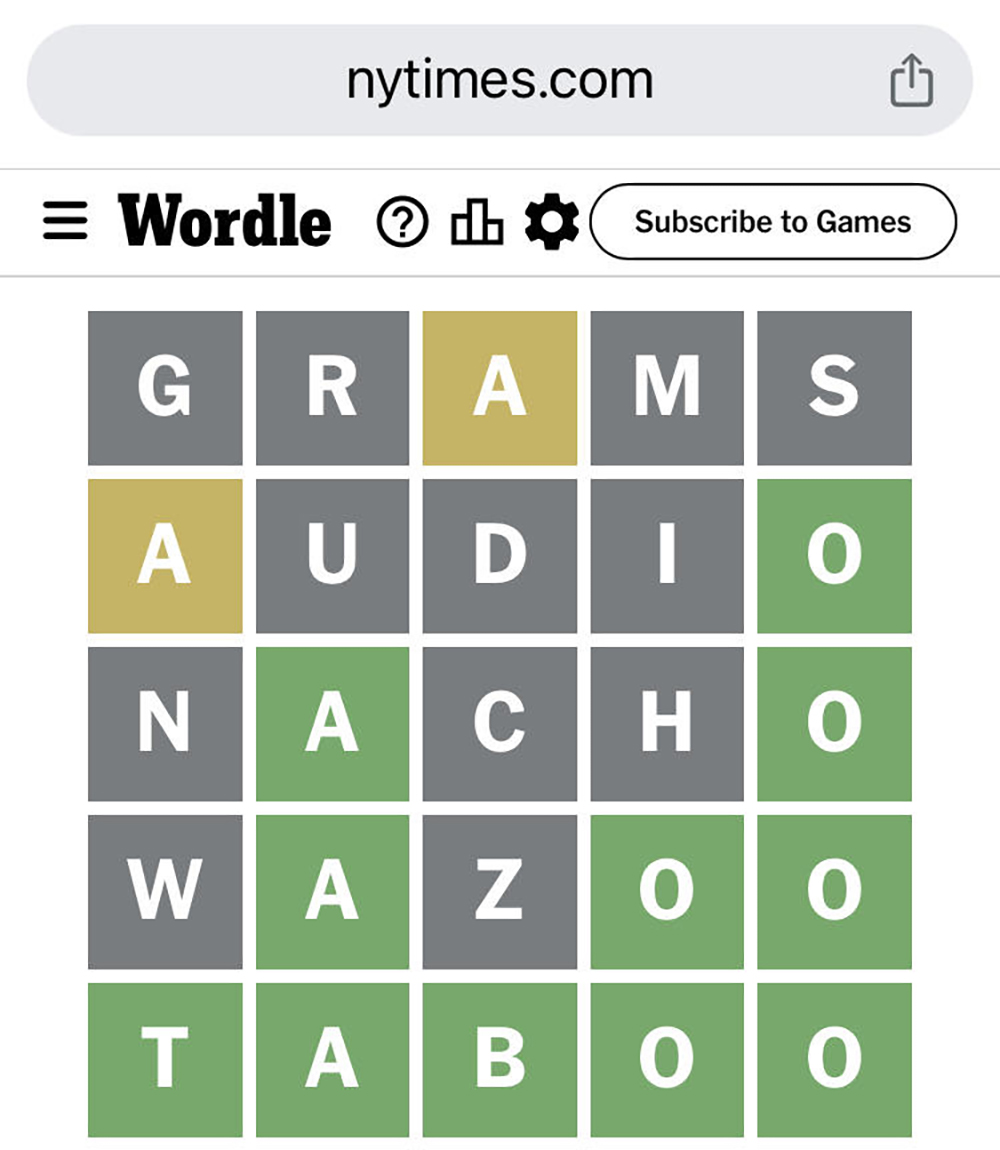I went with “wazoo” on my fourth guess. I should have gone with “taboo,” and because of that little miscalculation, it took me five tries to get Sunday’s Wordle instead of four. Dang.
A group of friends and I play The New York Times’ popular word game every day and share our scores with accompanying visuals. There are five of us, in different cities, connected mostly by school and family ties and a sense of humor. Our gimmick is that we take turns picking a different starter word every day, and quite often those words are, well, let’s just say, not geared to an easy solution.
Wordle aficionados know that you should start with a word like “arise” or “audio,” something with lots of vowels and/or often-used consonants. Our group doesn’t go that route (a decent starter word, by the way). For instance, “grams” is a terrible starter, but when one of our members announces she’s going to become a grandmother, that kind of stuff happens, and we roll with it. Nobody has suggested “zyxin” or “geese” yet, but it’s probably just a matter of time.
We humans love puzzles, and there is some evidence that the recent pandemic that kept us all mostly homebound for months just exacerbated those tendencies, not that we needed a push. Think of the great variety of such activities we engage in: crosswords, crypto-quotes, sudoku, mazes, find the difference between pictures, jigsaw puzzles, Scrabble, Jumbo. We watch television game shows like Jeopardy!, Wheel of Fortune, and Who Wants to Be a Millionaire? We play zillions of games on our phones — at least everyone in my doctor’s office does.
These little self-imposed challenges give us the thrill of the chase and the endorphin lift of success that follows overcoming an obstacle — attaining that “aha” moment. It’s no accident, I think, that most of the games we pursue are solitary endeavors. We’re testing ourselves, our brains, our thought processes, and finally, if we succeed, enjoying the dopamine of success. It’s addictive.
My morning routine goes as follows: Feed the dogs, make coffee, then sit down on the couch with my phone and do — in order — the Times’ Wordle puzzle, Mini-Crossword, Connections, Spelling Bee, and Letter Boxed. Then I hit The Washington Post website and do their Mini-Crossword and Keyword (one word to spell ’em all!). I’m done in 30 minutes or less, but if I miss a morning I feel incomplete. Some of you can relate, I’m sure.
It may make you feel better about your own gaming rituals to learn that human beings’ love for puzzles is rooted in more than just finding a diversion. It’s bred into our genes. Psychologists say that the urge to solve puzzles comes from human beings’ instinctual proclivity for pattern-finding, and for using those patterns to try to find solutions to problems.
And it goes even deeper than that. Humans have historically used the patterns they’ve observed in nature to search for the very meaning of life itself, to plumb its mysteries and magic. Our ancestors saw patterns in the stars and planets of the night sky, in the phases of the moon, in the duration of the sun’s rise and fall. They observed the rhythm of the seasons, the greening of the spring and the brown fade to winter, the solstices, the yearly cycle of life on Earth. They discovered the big picture, created calendars, clocks, began to measure the passage of time.
The discovery of these patterns led to the creation of gods, legends, and myths, as humans strove to understand their world and to give it meaning beyond the simple arc of life and death. Our coming to understand the seasons of the earth and the patterns in the night sky is why we have recurring annual celebrations, and why most of them are spiritual or religious in nature.
Seeing the patterns in life — whether it’s in a sunset of cirrus clouds, in the rings of a fallen oak, or the nebula of a sunflower blossom — can bring a sense of balance, a respite, a reassurance that all is not chaos and disorder. There is beauty and symmetry to be found in the course of every day that we’re alive and breathing, if we pause long enough to look for it. It can even be found in the simplest of puzzles. Today’s word is “pause.”
